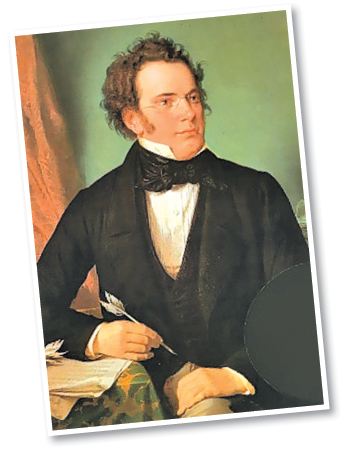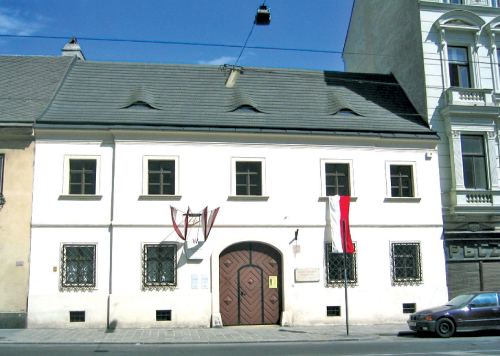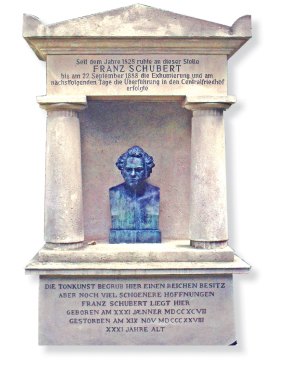Schubert, noted for harmony
Born on January 31, 1797 in Himmelpfortgrund, Austria, Franz Peter
Schubert, the son of a schoolmaster, received a thorough musical
education and won a scholarship to boarding school. Although he was
never rich, the composer's work gained recognition and popularity, noted
for bridging classical and romantic composition. He died in 1828 in
Vienna, Austria.
 Schubert demonstrated an early gift for music. As a child, his
talents included an ability to play the piano, violin and organ. He was
also an excellent singer. Schubert demonstrated an early gift for music. As a child, his
talents included an ability to play the piano, violin and organ. He was
also an excellent singer.
Franz was the fourth surviving son of Franz Theodor Schubert, a
schoolmaster, and his wife, Elisabeth, a homemaker. His family
cultivated Schubert's love of music. His father and older brother, Ignaz,
both instructed Schubert early in his musical life.
Scholarship
Eventually, Schubert enrolled at the Stadtkonvikt, which trained
young vocalists so they could one day sing at the chapel of the Imperial
Court, and in 1808 he earned a scholarship that awarded him a spot in
the court's chapel choir. His educators at the Stadtkonvikt included
Wenzel Ruzicka, the imperial court organist, and later the esteemed
composer Antonio Salieri, who lauded Schubert as a musical genius.
Schubert played the violin in the students' orchestra, was quickly
promoted to leader, and conducted in Ruzicka's absence. He also attended
choir practice and, with his fellow pupils, practised chamber music and
piano playing.
In 1812, however, Schubert's voice broke, forcing him to leave the
college, though he did continue his instruction with Antonio Salieri for
three more years. In 1814, under pressure from his family, Schubert
enrolled at a teacher's training college in Vienna and took a job as an
assistant at his father's school.
Franz Peter Schubert was among the first of the Romantics, and the
composer who, more than any other, brought the art song to artistic
maturity. During his short but prolific career, he produced masterpieces
in nearly every genre, all characterised by rich harmonies, an expansive
treatment of classical forms and a seemingly endless gift for melody. He
had written more than 100 songs as well as numerous symphonic, operatic,
and chamber music scores, before he reached the age of 20.
Schubert finally left his teaching position to dedicate himself
completely to musical pursuits. During the summer of 1818, the young
composer worked as a private music teacher to the aristocratic Esterházy
family. When he left that post in the fall, Schubert lived a somewhat
bohemian lifestyle, composing and spending time with a group of friends
that acted as his personal support system. In 1820, Schubert was
commissioned by two opera houses, the Karthnerthor Theatre and
Theatre-an-der-Wein, to compose a pair of operas. He wrote
Zwillingsbruden and Zauberharfe, both of which were unenthusiastically
received.
Schubert failed to secure a contract with a publisher, as none were
willing to take a chance on a relatively unknown composer who wrote
(harmonically) untraditional music. Schubert, along with the support of
his artistic friends, published his own work for a collection of roughly
100 subscribers.

These efforts, however, were financially unrewarding, and Schubert
struggled to sustain himself. His work garnered little attention and
contemporary composers dismissed his music as presumptuous and immature.
Reward
In 1823, Schubert was elected to the Musikverein of Graz, as an
honorary member. Though this brought no financial reward and was an
inconsequential appointment, Schubert relished its slight recognition,
and to show his gratitude, composed his famous Unfinished Symphony.
Five years later, Schubert's music was featured at a concert at
Vienna's Musikverein. His work was received quite enthusiastically, and
to much critical acclaim. This marked the only time during the
composer's life that he enjoyed such success. This seemed to provide
Schubert with a renewed sense of optimism, and despite illness, the
composer continued to produce at an incredible rate.
He began to organise a scheme to increase his artistic popularity, by
continuing to evaluate his work and progress as a musician, perhaps even
planning to study harmony privately. Schubert's health did not improve
 and he soon found himself at death's door. During the composer's last
moments, he instructed his brother Ferdinand to ensure that he would be
buried alongside Ludwig van Beethoven's grave. and he soon found himself at death's door. During the composer's last
moments, he instructed his brother Ferdinand to ensure that he would be
buried alongside Ludwig van Beethoven's grave.
Symphonies
Schubert revered the legendary composer, and was grateful to him, as
Beethoven had praised his work after hearing a selection of songs.
Schubert also highly regarded the work of both Franz Joseph Haydn and
Wolfgang Amadeus Mozart. Franz Schubert died of syphilis.
Despite his short life, Schubert produced a wealth of symphonies,
operas, masses, chamber music pieces, and piano sonatas, most of which
are considered standard repertoire. He is known primarily for composing
hundreds of songs including Gretchen am Spinnrade, and Erlkonig. He
pioneered the song cycle with such works as Die Schöne Müllerin and Die
Winterreise, and greatly affected the vocal writing of both Robert
Schumann and Gustav Mahler.
For a composer of over 600 mostly brief-songs, Schubert's sense of
structure for orchestral works was monumental by comparison. Each of his
final symphonies, piano trios, quartets, quintets, and piano sonatas,
when played with all his designations for repeated sections, lasts
upward of 40 to 45 minutes.
This makes his achievement with the string quartet in D Minor all the
more remarkable, for the ferocious energy in Schubert's confrontation
with death in this masterpiece never falters or flags. A performance of
this quartet, from a composer not yet thirty years old, leaves both the
performers and audience exhausted yet profoundly moved. And to think
that all of this inspiration came from a song of no more than three
minutes duration! (The song, Death and the Maiden, serves as the basis
for the theme and variations in the second movement.)
This quartet rightly takes its place alongside the greatest of
Beethoven, Mozart, and Bartok at the pinnacle of the chamber music
repertoire.
-Internet |

